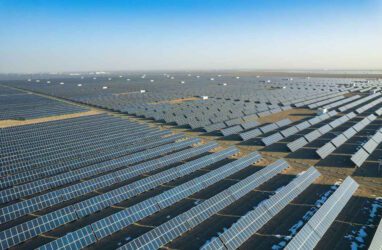Feed aggregator
Verra adopts Peru’s REDD baselines as developers’ backlash to benchmarks continues
Cairngorms estate goes back on sale after criticism of ‘green laird’ owner
Campaigners say sudden sale suggests Abrdn’s use of Scottish countryside was ‘get-rich-quick scheme’
A Scottish estate that became a lightning rod for disputes over wealthy “green lairds” buying up the Highlands has been unexpectedly put up for sale.
The Far Ralia estate in the Cairngorms has gone on the market for £12m, three years after it was bought for £7.5m by an investment trust run by Standard Life, now Abrdn, as a way to offset carbon emissions from its properties.
Continue reading...Credit retirements fall 10% in Q2 as corporates shift away from ‘carbon neutrality’ claims -analysts
China installs more than 100GW of solar in first half of 2024
The post China installs more than 100GW of solar in first half of 2024 appeared first on RenewEconomy.
Plenty of room available for renewables in Europe, campaigners say
Monday was hottest recorded day on Earth: ‘Uncharted territory’
Data shows that the global surface air temperature reached 62.87F compared with 62.76F on Sunday.
World temperature reached the hottest levels ever measured on Monday, beating the record that was set just one day before, data suggests.
Provisional data published on Wednesday by the Copernicus Climate Change Service, which holds data that stretches back to 1940, shows that the global surface air temperature reached 62.87F (17.15C), compared with 62.76F (17.09C) on Sunday.
Continue reading...Science-based targets overly simplistic and can lead to unequal distribution of responsibility -paper
Global fertiliser company signs up for green offtake from Paraguay
Tree bark plays vital role in removing methane from atmosphere, study finds
Researchers uncover ‘remarkable new way in which trees provide a vital climate service’ by reducing emissions
Microbes in the bark of trees play a vital role in removing methane from the atmosphere, scientists have discovered.
The greenhouse gas is a product of agriculture and the burning of fossil fuels and is 28 times more potent than carbon dioxide. However, it remains in the atmosphere for a shorter time.
Continue reading...Global coal demand to remain unchanged through 2025, despite rise in renewables -IEA
Rare fossils reveal secrets of mammal evolution
Clear Sky announces two SAF deals on Wednesday
Steelmakers throw weight behind EU power market reform to drive decarbonisation
‘High quality, low price and dizzying variety’: how the Chinese switched to electric cars
The country has long been the world’s biggest market – but the government’s interest is more geopolitical than environmental
When Kenzi, an advertising worker in Shanghai, bought an electric vehicle in November she wasn’t even thinking about the environmental benefits. She had read Elon Musk’s biography and thought the Tesla 3 looked good. She also knew that if she bought an EV she could bypass the long wait and cost of getting licence plates, which are rationed by the government.
“It’s not easy to get a licence plate in Shanghai, but you get a licence for free when you buy an EV,” she said.
Continue reading...EKI Energy reports net profit in last quarter following its venture into power trading
President Ramaphosa signs into law South Africa’s landmark Climate Change Bill
CAR releases draft Argentina biogas livestock protocol for public comment
Australia could fix landscapes with just 0.3% of GDP in funding -scientists
It’s easy to blame petrostates – but self-proclaimed ‘climate leaders’ like the US and UK are driving the crisis | Tessa Khan
In thrall to the oil and gas industries, wealthy nations are backing calamitous projects. But the tide is turning
- Tessa Khan is executive director of the climate action organisation Uplift
It is a delusion to believe that the world’s climate is being pushed to the brink solely by undemocratic petrostates such as Russia and Saudi Arabia. The truth is that about half of all planned oil and gas developments between now and 2050 will be sanctioned by wealthy governments that position themselves as climate leaders: the US, Canada, Australia, Norway and the UK.
It is the countries that like to think of themselves as the good guys that are driving the climate crisis – and not just because of historical emissions and the high-carbon lifestyles of our middle class. It is because our governments refuse to take one of the most obvious actions needed to stop the crisis: keeping oil and gas in the ground. As we have heard time and again, governments are planning to sanction vastly more oil and gas than can be burned in a world with a safe climate.
Tessa Khan is a lawyer and the executive director of the climate action organisation Uplift
Continue reading...



